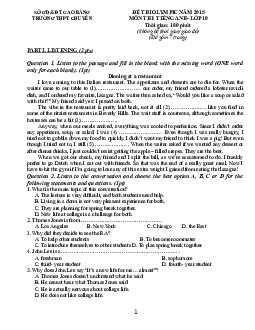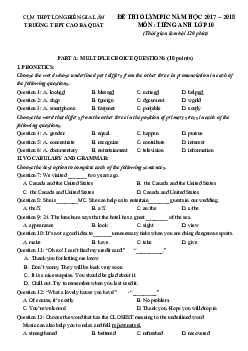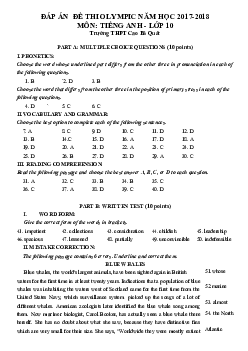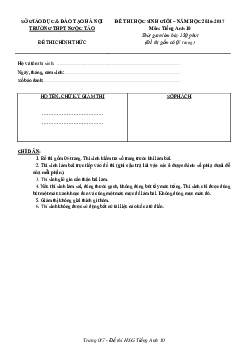













Preview text:
TRƯỜNG THPT SƠN TÂY
ĐỀ THI CHỌN HỌC SINH GIỎI CẤP TRƯỜNG Năm học: 2018 - 2019
Môn thi: Tiếng Anh Lớp: 10
Ngày thi: 18 tháng 3 năm 2019
Thời gian làm bài: 180 phút Chú ý:
- Đề thi gồm 10 trang, 100 câu.
- Thí sinh làm bài trực tiếp vào tập đề thi này.
- Không dùng bất cứ loại từ điển nào.
- Giám thị không giải thích gì thêm. SỐ PHÁCH
Họ và tên: . . . . . . . . . . . . . . . . . . . .
HỌ TÊN & CHỮ KÝ
Sinh ngày: . . . . . . . . . . . . . . . . . . . . Giám thị số 1: . . . . . . . . . . . . .
Số báo danh:.. . . . . . . . . . . . . . . . . .
Lớp:.. . . . . . . . . . . . . . . . . . . . . . . .
Giám thị số 2: . . . . . . . . . . . . .
TRƯỜNG THPT SƠN TÂY
ĐỀ THI CHỌN HỌC SINH GIỎI CẤP TRƯỜNG
Năm học: 2018 - 2019 0
Môn thi: Tiếng Anh Lớp: 10
Ngày thi: 18 tháng 3 năm 2019
Thời gian làm bài: 180 phút HỌ TÊN, CHỮ KÍ SỐ PHÁCH ĐIỂM GIÁM KHẢO SỐ 1 GIÁM KHẢO SỐ 2 PART A: LISTENING
Complete the notes below. Write ONE WORD ONLY for each answer. GEOGRAPHY
Studying geography helps us to understand:
• the effects of different processes on the (1) …………………. …. of the Earth
• the dynamic between (2) ………………..………..…. and population
Two main branches of study: • physical features
• human lifestyles and their (3) ………………………………….
Specific study areas: biophysical, topographic, political, social, economic, historical and
(4) …………………………………….…. geography, and also cartography
Key point: geography helps us to understand our surroundings and the associated
(5) …………………………………….…. What do geographers do?
• find data- e.g. conduct censuses, collect information in the form of
(6) ………………………….……. using computer and satellite technology
• analyse data - identify (7) …………………………….…. , e.g. cause and effect
• publish findings in form of: a) maps - easy to carry
- can show physical features of large and small areas
- BUT a two-dimensional map will always have some
(8) ……………………………………………… 1 b) aerial photos
- can show vegetation problems, (9) ………………… density, ocean floor etc.
c) Landsat pictures sent to receiving stations
- used for monitoring (10) ………………………..………. conditions etc. PART B: PHONETICS
I. Pick out the word whose underlined part is pronounced differently from the rest. 11. A. creature B. creative C. creamy D. crease 12. A. brood B. broomstick C. foolscap D. brooch
II. Choose letter A, B, C or D to indicate the word that differs from the rest in the
position of the main stress in each of the following questions. 13. A. coherent B. permanent C. continent D. sentiment 14. A. sanctuary B. contingency C. literacy D. aggravate
15. A. innovative B. commentary C. alternative D. bodybuilder
PART C: GRAMMAR & VOCABULARY
I. Choose the word/phrase that best completes each of the following sentences.
16. Mary's mother ________ her against taking too much luggage on her trip. A. warned B. recommended C. encouraged D. reprimanded
17. You haven't heard all the facts so don't ________to conclusion. A. fly B.dash C. jump D. spring
18. ________ his advice, she would never have got the job. A. But for B. As for C.Except D. Apart from
19. “ I’ve never seen that movie. ” - “________ have I.” A. either B. neither C. so D. too
20. Picasso was a well-known ________cubist artist. A. artistic B. celebrated C. colourful D. knowledgeable
21. You have to be rich to send a child to a private school because the fees are ________. A. astronomical B. astrological C. atmospherical D. aeronautical
22. The ________ of thirst is based on the concentration of salt in the blood. A. sensation
B. sentiment C. response D. impression
23. The government is expected to _______ steps against the unemployment. A. use B. make C. take D. apply
24. The taxi had to ________ because the traffic lights had turned red. A. set up B. catch up C. cut up D. pull up
25. His wife died last year and he still can’t _________ to terms with her death. A. get B. go C. come D. contribute
26. We were working overtime to cope with a sudden _______ in demand. A. surge B. boost C. impetus D. thrust
27. These painkillers __________ after about two hours. A. wear off B. drop off C. turn down D. stand for
28. _________ out of the shop, my friend Roger came in. 2 A. Coming B. On coming C. When coming D. As I came
29. ________ our project was unnecessary, we would not have invested in it. A. Had we thought B. Unless had we thought C. If had we thought D. As we had ever thought
30. The red light goes on outside the studio door to let people know that you are _______ air. A. on the B. by C. in D. through the
II. Use the verbs and particles given to make up phrasal verbs and complete the
sentences. Make sure to put the verbs in their correct form.
Verbs: SHOW, SETTLE, STAND, WAIT, MAKE, RUN (2), LOOK, COME
Particles: BY, OUT OF, AWAY, OFF, OVER, UP, ON, ACROSS, OUT, ON
31. - What did Mr. Smith say at the end of the meeting?
- He told us that he …………………………. patience.
32. Edna sometimes ………………………. a list of things to do for the whole week.
33. You should go to the library to………………. some facts about early Vietnamese history.
34. Good friends will always …………………………. you when you are in need.
35. While looking for an English book, I………………………. a novel by Charles Dickens.
36. Some women invited to a wedding party always try to……………………. their figures.
37. The waiter who …………………………. me was very pleasant.
38. Most drivers are unhappy if they …………………………. an animal.
39. His last hours were quiet, and he …………………………. without pain.
40. The Jacksons have…………………………. the terms for buying their machines.
III. Supply the correct forms of the words in brackets.
41. In some countries, giving birth of women in remote areas is ……………………(control).
42. We were defeated because we were ……………….. . . . .…. (number).
43. She is very efficient, and…………………………………. polite to the customers (fail).
44. There's a. . ……….. railway line; there haven't been any trains there for ten years (use).
45. That would …………………………… the values of achievement and efficiency (body).
46. No one can understand Lewis's behavior. It's …………………………………. (explain).
47. The……………………………has caused many so-called man-made disasters (forest).
IV. The passage below contains 10 mistakes. IDENTIFY and CORRECT them. 1
Man has always depended on plants of food and many other useful products. For this
reason, farming is that of the world's most important industries. At first, early man did
not know how to plant seeds and raise crops. He gathered wide fruits and vegetables 3
where he found them. Then man discovered how to grow his own food. He planted
5 seeds and waited for the crop to grow. For the first time, he could be reasonably sure of
his food supply. He could settle down and build shelters in the places where he grew
food. Populations beginning to increase, the demand for food became greater. Old-
fashioned tools and farming methods were inefficient at meeting the demand. So man
cultivated more still more land and invented more complicated machines to make his
10 work easier. Tractors replaced horses and other farm animals. Scientists studied and
experimented with plants. They told farmers how to control plant diseases, and how too
grow bigger and better crops. Now another man, with a knowledge of plants and the
help of machine, can cultivate hundreds of acres. He can raise plants which does not
originally grow in the soil or weather of his community. Your answers: Line Qs Mistakes Corrections Line Qs Mistakes Corrections …… 48 …… 53 …… 49 …… 54 …… 50 …… 55 …… 51 …… 56 …… 52 …… 57 PART D: READING
I. Fill in each blank with only ONE word.
The normal body temperature of a full-grown person measure 98,6 degrees on a
Fahrenheit (58) . . . . . . . . . . . . . . . . . Although the body's temperature may vary above and
(59) . . . . . . . . . . . . . . . . . this point, the variations are usually quite small. A change in the
body's temperature of more than ten degrees either way would probably cause death.
The regulation of body temperature is a delicate and continuous process. In man and
other warm-blooded (60) . . . . . . . . . . . . . . . . . ,temperature is automatically kept uniform (61)
. . . . . . . . . . . . . . . . . normal conditions. In the body, heat is produced at all times
(62) . . . . . . . . . . . . . . . . . at varying rates of speed. The heat is carried by the blood to the skin
surfaces. (63) . . . . . . . . . . . . . . . . . there, it passes off into the air. 4
If the body becomes too Warm, the surface blood vessels become larger and carry more
(64) . . . . . . . . . . . . . . . . . .In this way, more heat can be brought to the surface of the skin and
sent out of the body. In addition, as the body becomes warmer, the sweat glands pour out
perspiration which evaporates and helps (65) . . . . . . . . . . . . . . . . . the body.
These processes are (66) . . . . . . . . . . . . . . . . . when the body becomes cold. To keep the
body temperature from dropping far below the normal, the surface blood vessels grow
(67). . . . . . . . . . . . . . . . . and perspiration is checked.
II. Read the following passage and then choose the correct answer.
The issue of equality for women in British society first attracted national attention in the
early 20th century, when the suffragettes won for women the right to vote. In the 1960s
feminism became the subject of intense debate when the women’s liberation movement
encouraged women to reject their traditional supporting role and to demand equal status and
equal rights with men in areas such as employment and pay.
Since then, the gender gap between the sexes has been reduced. The Equal Pay Act of
1970, for instance, made it illegal for women to be paid less than men for doing the same
work, and in 1975 the Sex Discrimination Act aimed to prevent either sex having an unfair
advantage when applying for jobs. In the same year, the Equal Opportunities Commission was
set up to help people claim their rights to equal treatment and to publish research and statistics
to show where improvements in opportunities for women need to be made. Women now have
much better employment opportunities, though they still tend to get less well-paid jobs than
men, and very few are appointed to top jobs in industry.
In the US the movement that is often called the “first wave of feminism” began in the
mid 1800s. Susan B. Anthony worked for the right to vote, Margaret Sanger wanted to provide
women with the means of contraception so that they could decide whether or not to have
children, and Elizabeth Blackwell, who had to fight for the chance to become a doctor, wanted
women to have greater opportunities to study. Many feminists were interested in other social issues.
The second wave of feminism began in the 1960s. Women like Betty Friedan and
Gloria Steinem became associated with the fight to get equal rights and opportunities for
women under the law. An important issue was the Equal Rights Amendment (ERA), which
was intended to change the Constitution. Although the ERA was not passed, there was
progress in other areas. It became illegal for employers, schools, clubs, etc. to discriminate
against women. But women still find it hard to advance beyond a certain point in their careers, 5
the so-called glass ceiling that prevents them from having high-level jobs. Many women also
face the problem of the second shift, i.e. the household chores.
In the 1980s, feminism became less popular in the US and there was less interest in
solving the remaining problems, such as the fact that most women still earn much less than
men. Although there is still discrimination, the principle that it should not exist is widely accepted.
Question 68. It can be inferred from paragraph 1 that in the 19th century, ______.
A. British women did not have the right to vote in political elections
B. most women did not wish to have equal status and equal rights
C. suffragettes fought for the equal employment and equal pay
D. British women did not complete their traditional supporting role
Question 69. The phrase “gender gap” in paragraph 2 refers to ______.
A. the social relationship between the two sexes
B. the visible space between men and women
C. the social distance between the two sexes
D. the difference in status between men and women
Question 70. Susan B. Anthony, Margaret Sanger, and Elizabeth Blackwell are mentioned as ______.
A. American women who were more successful than men
B. American women who had greater opportunities
C. pioneers in the fight for American women’s rights
D. American women with exceptional abilities
Question 71. The Equal Rights Amendment (ERA) ______.
A. supported employers, schools and clubs B. changed the US Constitution
C. was brought into force in the 1960s D. was not officially approved
Question 72. In the late 20th century, some information about feminism in Britain was issued by ______.
A. the Equal Rights Amendment B. the Equal Pay Act of 1970
C. the Equal Opportunities Commission D. the Sex Discrimination Act
Question 73. Which of the following is true according to the passage?
A. The US movement of feminism became the most popular in the late 20th century.
B. The British government passed laws to support women in the early 20th century.
C. The women’s liberation movement in the world first began in Britain.
D. The movement of feminism began in the US earlier than in Britain. 6
Question 74. The phrase “glass ceiling” in paragraph 4 mostly means ______.
A. a ceiling made of glass
B. an imaginary barrier C. a transparent frame
D. an overlooked problem
Question 75. Which of the following is NOT mentioned in the passage?
A. An American woman once had to fight for the chance to become a doctor.
B. British women now have much better employment opportunities.
C. There is now no sex discrimination in Britain and in the US.
D. Many American women still face the problem of household chores.
III. You are going to read a magazine article on space travel. Some paragraphs have
been removed from the article. Choose from the paragraphs A- G the one which fits each
gap (76- 80). There is one extra paragraph which you do not need to use. There is an example at the beginning (0). Cheap Access to Space
Charles Conrad went to the moon with Apollo 12 and circled the Earth in Skylab. But
from now on, he is going to aim high for himself. His company, Universal Space Lines, hopes
to produce a more economic rocket, that will be able to go into space again and again. 0 G
NASA, The U. S. government-owned space program plans to develop such a rocket.
However, the immediate priority is missions to Mars, which will require different technology.
So it is more likely that people outside the NASA program will develop re-usable rocket
design. Rick Tumlinson runs an independent organization called the Space Frontier Foundation
and firmly believes that it is time for businesses to get involved. 76 _______
So Tumlinson is also in business to prove a point. Space is our destiny, he says, so why
not get on with it a bit more eagerly? To this end, the SFF is holding a conference in Los
Angeles shortly to be called Space: Open for Business. 77 _______
Another company, Kistler Aerospace, has similar plans: “Our goal is to become a
delivery service to low Earth orbit that will radically re-align the economics of doing business
in space. Satellites will be our parcels; our vehicles will be operated in repeated flights with air freight efficiency.” 78 _______ 7
Their own view is that it is impossible for NASA, which is government- owned, to offer
an “open frontier”. This is not a matter of budgets or schedules, but of fundamental purpose
and design. NASA is “elitist and exclusive”, whereas the SFF believe in opportunities for
everyone: “a future of endlessly expanding new choices”. 79 _______
Of course, the ex-astronaut and businessman Charles Conrad agrees. “I’m trying to get
affordable space transportation up and operative so that everybody can go enjoy space. And by
the way, the Japanese are hard at work building a space hotel.” 80 _______
If he is right, mass space travel will have arrived by 2030 and space tourism will have
become a viable industry. More importantly, the human race will have made serious progress
in crossing that final frontier. GIVEN PARAGRAPHS A.
Companies will always be looking for profit. For this reason, the SFF is not in favour of
American missions to Mars, claiming that there’s nothing in it for investors. At the same time,
they do accept that these missions could bring scientific benefits. B.
He sees the NASA program as a bit of a dinosaur. “25 years after the Wright Brothers,
people could buy a commercial plane ticket but 25 years after landing on the moon, we sat
around watching old astronauts on TV talking about the good old days.” C.
In 1997, the SFF ran a survey on the Internet, called “a Cheap Access to Space”,
where it asked American taxpayers for their views on the U. S. space program and on what
America’s future priorities should be in space transportation. D.
U. S. government officials don’t see a future for space tourism. Here again, private
companies may well prove them wrong. David Ashford, director of Bristol Spaceplanes
Limited, once said that space tourism would begin ten years after people stopped laughing at
the concept. Recently, he added this striking comment: “people have stopped laughing.” E.
Charles Conrad is due to speak there. But his company is in fact only one of several
that already have blueprints for getting into space and back cheaply. Rotary is working on
something that would be launched like a rocket but return like a helicopter. Pioneer
Rocketplane believes there could be a million dollar market in delivering packages from one
side of the planet to the other in an hour. F.
They would like to see “irreversible human settlement” in space as soon as possible
and maintain that this will only happen through free enterprise. “Building buildings and
driving trucks is not what astronauts should be doing; that’s what the private sector does.” 8 G.
“Cheap” is an important word in space technology nowadays and re-usable rockets
will be a key way of controlling costs. They will deliver things to orbit, bring stuff back to
Earth and then go up again, perhaps with machinery for a space factory, or even carrying tourists. PART E: WRITING
I. Finish each of the following sentences so that it means the same as the printed one.
81. His memory gradually failed as he grew old.
=> The____________________________________________________________
82. Under no circumstances should you phone the police.
=>The last_________________________________________________________
83. The best solution is thought of by Peter.
=> Peter came up with the best solution__________________________________
84. Mai thought the man in front of her was her former teacher.
=> Mai mistook _____________________________________________________
85. I was not surprised to hear that Harry had failed his driving test.
=>It came__________________________________________________________
86. It is not certain that John will get the job.
=> It is open________________________________________________________
87. The hurricane blew the roof off the house.
=> The house_______________________________________________________
88. John and Mike got up late this morning.
=> Neither_________________________________________________________
89. Don't you wish you could get out more in the evenings?
=> Don't you get fed _________________________________________________
90. We will stop off in France on our way to Germany.
=>We will break____________________________________________________
II. Rewrite the following sentences using the given words. Do not alter these words.
91. The girl's behavior was incomprehensible to the Head Teacher. (LOSS)
__________________________________________________________________
92. She had completely forgotten him. (MIND)
__________________________________________________________________
93. The fact that he will never race again is something he can't accept. (TERMS) 9
__________________________________________________________________
94. He has definitely agreed to accept the job. (COMMITTED)
__________________________________________________________________
95. Ours is the only company allowed to import these chemicals. (MONOPOLY)
__________________________________________________________________
96. He very much surprised her when he said he loved her. (BREATH)
__________________________________________________________________
97. He does not appreciate his wife. (GRANTED)
__________________________________________________________________
98. My friend took no notice of my advice. (DEAF)
__________________________________________________________________
99. It will take a while for your visa to come through. (COURSE)
__________________________________________________________________
100. He modestly understated his part in the rescue. (DOWN)
__________________________________________________________________ --THE END-- 10
TRƯỜNG THPT SƠN TÂY
ĐÁP ÁN ĐỀ THI HỌC SINH GIỎI CẤP TRƯỜNG Năm học: 2018-2019
Môn thi: Tiếng Anh Lớp 10
Ngày thi: 18 tháng 3 năm 2019
Thời gian làm bài: 180 phút
Đề bài có 100 câu, mỗi câu đúng cho 0,2 điểm. PART A: LISTENING 1. surface 2. environment 3. impact(s) / effect(s) 4. urban 5. problems 6. images 7. patterns 8. distortion(s) 9. traffic 10. weather PART B: PHONETICS
11. B 12. D 13.A 14.B 15.C
PART C: GRAMMAR & VOCABULARY I.
16. A 17. C 18. A 19. B 20. B 21.A 22.A 23. C 24. D
25. C 26. A 27.A 28. D 29. A 30. A II.
31. ran out of 32. makes out 33. look up 34. stand by 35. came across 36. show off
37. waited on 38. run over 39. passed away 40. settled on III.
41. uncontrollable 42. outnumbered 43. unfailingly 11 44. disused 45. embody 46. inexplicable 47. deforestation IV. Your answers: Line Qs Mistakes Corrections Line Qs Mistakes Corrections …1… 48 of for …11… 53 too to …2… 49 that one …12… 54 another a/one …3… 50 wide wild …13… 55 machine machines …8… 51 at in …13… 56 does did …9… 52 still more …14… 57 weather climate PART D: READING
I. 58. thermometer 59. below 60. animals 61. under 62. but 63. from
64. blood 65. cool 66. reversed 67. smaller II. 68. A 69.C 70.C 71. D 72. C 73. D 74. B 75. C III. 76.B 77.E 78.C 79.F 80.D PART E: WRITING I.
81. The older he grew, the more his memory failed.
82. The last thing you should do is to phone the police.
83. Peter came up with the best solution.
84. Mai mistook the man in front of her for her former teacher .
85. It came as no surprise to me (to hear) that Harry had failed his driving test.
86. It is open to question whether John will get the job.
87. The house had the roof blown off by the hurricane.
88. Neither John nor Mike got up early this morning.
89. Don't you get fed up with staying/ having to stay at home in the evenings?
90. We will break our journey in France on our way to Germany. 12 II.
91. The Head Teacher was at a loss to comprehend the girl's behavior.
92. He had gone out of her mind.
93. He cannot come to terms with the fact that he will never race again.
94. He has definitely committed to accepting the job.
95. Our company has (got) the monopoly of importing these chemicals.
96. He took her breath away when he said he loved her.
97. He takes his wife for granted.
98. My friend turned a deaf ear to my advice.
99. Your visa will come through in due course.
100. He (modestly) played down his part in the rescue. --THE END-- 13




